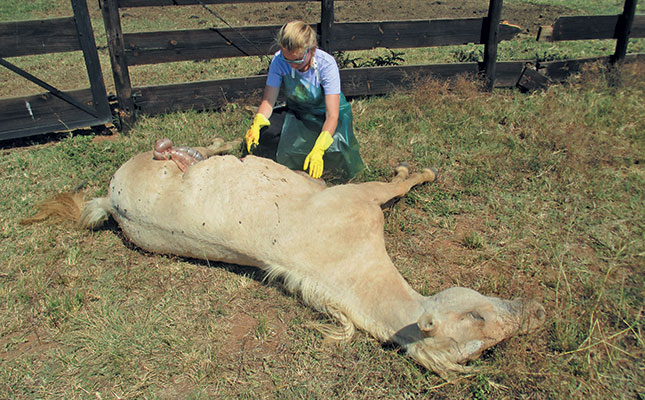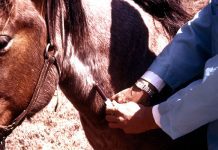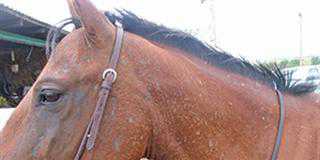
Photo: Dr Mac
It is now also possible to treat even severe cases successfully, but early diagnosis is key. Fortunately, a PCR (polymerase chain reaction) test can be used to confirm the presence of the AHS virus.
Indeed, vets are now obliged to take a blood sample from a live horse, or a spleen specimen at post-mortem, if they suspect AHS. Both the University of Pretoria’s Faculty of Veterinary Science Equine Genetics Laboratory and the Onderstepoort Veterinary Institute can perform the test.
Don’t try to take a sample yourself, as certain diseases that have similar signs to AHS, such as West Nile fever and Lyme disease, can be transmitted to humans through needle pricks.
However, you can speed up the diagnosis by transporting the sample to the laboratory personally or couriering it.
The laboratories are open only during office hours on weekdays, and it can take two weeks to get the results. In the meantime, your vet can treat the symptoms, using anti-inflammatory drugs to reduce the fluid in the lungs, or treating piroplasmosis, Lyme disease or babesiosis if the horse is anaemic, shows fever, or has a positive blood smear.
AHS often occurs in horses that have a weak immunity due to chronic biliary; the virus TALKand parasite act together to increase the severity. If the horse survives the first stage (the lung stage), it may start showing cardiac signs, and the vet will start to treat symptomatically with a different range of drugs to improve heart function.
In severe cases, you may have to get the vet in daily for several days, or hospitalise the horse for intensive care. (It really is worth getting insurance for hospital expenses for valuable horses!)
Prevention strategies
There are four strategies for preventing AHS: vaccination, stabling, midge repellents, and midge control.
Vaccination is crucial for all horses older than six months, and horses should be vaccinated between 1 June and 1 October annually.
Stabling between 4pm and 10am is very important, particularly for young horses, as this is when midges are active.
Repellents against both stable flies and midges are recommended. Citronella oil is more effective against flies, while DEET (Tabard or Peaceful Sleep) is best for mosquitoes and midges.
Deltamethrin is safe, even for foals; cypermethrin is effective for both flies and midges, although toxic for cats. Both are registered for use in dogs and horses, and are also effective against ticks.
Warm, misty, calm days are ideal for midges, and thousands can hatch and fly off in search of a blood meal. Stabling and repellents prevent females from obtaining this blood meal, rendering them infertile and reducing the number of midges.
To prevent midge eggs from hatching, keep grass around the stables short, and cover muddy, manure-contaminated patches with sand or rubber mats.
Agricultural lime can be sprinkled or worked into muddy soil around the stables with a fork, as it prevents fly and midge larvae from emerging through the soil.
Dr Mac is an academic, a practising equine veterinarian and a stud owner.












